#iacs
Text
IACS issues the annual review for 2022

View On WordPress
0 notes
Photo

#sleepingkitten #freakingadorable #fosteringkittens #savinglives #iacs #lovethemsomuch❤️ (at Indianapolis, Indiana) https://www.instagram.com/p/CgFqwf0uxAX/?igshid=NGJjMDIxMWI=
0 notes
Text
since this post is doing the rounds again, i want to take a moment to remind everyone that saving lbh from the bullying disciples, saving lqg's life, almost sacrificing himself to protect the sect during the demon invasion, are things that sqq does without any ulterior motives. if he wanted to capitalize on his good deed, he would have revealed himself after protecting lbh. when he meets lqg in the lingxi caves, it surprises him to see him there, and it's after he's already rescued lqg from a qi deviation that it occurs to him that "hmmm, this is a good ally to have, just in case". and during the demon invasion, after getting poisoned, he was ready to self-detonate so that he could take out sha hualing.
like, yeah, sy!sqq is smart and cares about his own survival-- but he's also a big softie that can't stand seeing people hurt and do nothing
#svsss#svsss meta#shen yuan#shen qingqiu#zykamiliah-svsss#lol and this is just from the first arc i'm not even touching the post iac timeline#hey remember how mushroom qingqiu stayed in the borderlands instead of getting the fuck away from there#like the smarter thing would have been to beat it#run for the hills far away from the plot and everyone else#with his mushroom body he was overpowered enough to go anywhere do anything he wanted#but nooooooo he had to meddle#ooh disciples captured i must act i can't help himself#sqq you damn mother hen
179 notes
·
View notes
Text





Commission batch for @reversal-mushroom
#what a fun batch of characters!!#I had a great time working on dynamic poses for each that corresponded well with their personality#commissions#mlp#digital art#procreate#songbird serenade#maneiac#mane iac#glamour gleam#king sombra#sombra#chrysalis#queen chrysalis#pony#mlp commissions#pony commissions
364 notes
·
View notes
Note
Do you know why everyone and their mother keeps saying that Sheb Qingqiu's secluded cultivation lasts for a year or 3??? Last I checked, wasn't he only in the cave for several months??
...I haven't seen a fic use that timeframe in quite a while - am I the delusional one??
Having intensively cultivated for several months, he could freely
control his spiritual energy and had risen one level above his original
cultivation base.
... nope, still as I remembered from the official book, page 85 in my copy. Even my old Exiled Rebels translation puts it as, "several months." Last I checked, 12 (or 36) months is far too many to simply be considered "several", so what am I missing? It just- throws off the timeline so badly and greatly increases the amount of time poor Binghe is stuck in the woodshed, for what?
Okay, so the 3 years thing comes from the donghua, no need to look further. It's one of those things that directly go against canon but have stuck in people's minds, similar to 'the washerwoman was the one to pull baby Binghe out of the river' and 'Shen Qingqiu fainted dramatically several times early on in his transmigration'.
Then, I don't believe I have seen 1 year myself, but if I had to guess, it may come from the fact that Binghe is 14yo prior to SQQ entering seclusion and 15 once he leaves. That said, an entire year makes zero sense considering what we know of the timeline.
Which is where I confess that I tore out some hair over the length of SQQ's seclusion when constructing the timeline for Transmigrator Time Traveler, because for me 'several' months means 3 to 5, but given all the facts, SQQ's seclusion had to last somewhere between 6 and 10 instead. (I went with 9 in the end, for the fic, cause I've read that 9 is a significant number for spiritual practices cultivation is based on? the source was a little vague so i don't know how true that is, but I needed a number.)
Nevermind, to the aforementioned facts. MXTX confirmed the date of the first chapter publication - Sept.21 - to be the date of SQQ's transmigration. (Small note: I'll be using modern months, even though SV's world uses lunar calendar, because it's easier to gauge weather and stuff. For characters in the novel, they might see those as different months/seasons, but that doesn't really affect our purpose here.) Luo Binghe’s 15th birthday - which Shen Qingqiu missed in seclusion - is in winter ('coldest day' which I after some research came to hc as jan6, though that's not particularly relevant, because...) Demon invasion happened on a 'hot day' (SQQ mentions it in relation to how SHL is dressed) - which puts it in May at the earliest, August at the latest. So these are the 'borders' we are working with.
Now, to my actual calculations. We know SQQ spent some time on the Peak after transmigration, before the Skinner mission that led to him going to seclusion. So I'm gonna say that happened in October at the earliest, December if you stretch it (though I feel like his tatas would freeze off if the Skinner left him half-undressed in December...) - but definitely not later, cause Binghe’s birthday has to happen off-screen. So if we take the longest possible time frame, October to August, we get 10 months. The slimmest possible window - December to May - gives us 5 months, but between the aforementioned boob hypothermia issue and the fact that May is a bit of a stretch for the 'hot day', I think that 6 months is the shortest you can go.
Which, again, doesn't align with my understanding of what should be described as 'several' months, but what can you do... tbh, im not sure MXTX thought all that hard about the timeline, which is understandable as a writer - but as a fan, frustrating
So yeah - definitely less than a year (and absolutely not 3, donghua), though the math gets fuzzier after that.
#that said im pretty sure that donghua's 3 years is to save on Binghe models... he def has different ones pre and post seclusion#but im pretty sure that demon invasion and IAC binghes have at the very least the same head. not sure about if the clothes are a recolor too#still... feel like they couldve handled it more gracefully. like for example not mentioning the time frame at all 🙄#svsss#shen qingqiu#luo binghe#svsss meta
58 notes
·
View notes
Text
Twin Fight Rewrite!
I finally finished rewriting the twin fight scene in Chapter 1! The main problem with it was how abrupt the fight starts, so hopefully the scene rewrite will solve that, as well as clarify some things about the big fight between the twins.
Here's a preview of the whole scene! The MC shown here has default personality stats, with [Halfling Ancestry], [Follower], [Caregiver], [Main Protagonist] Traits, and chose to keep Maggie's locket picture.

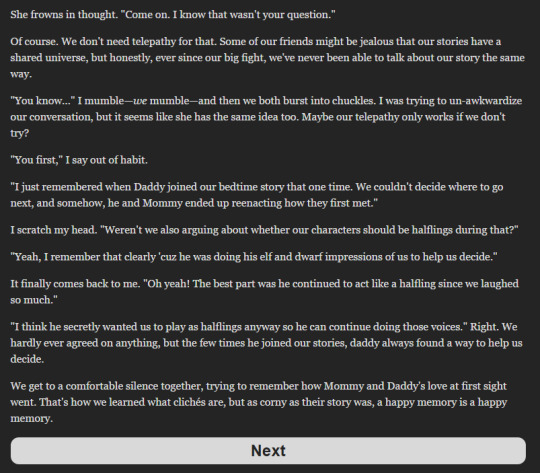

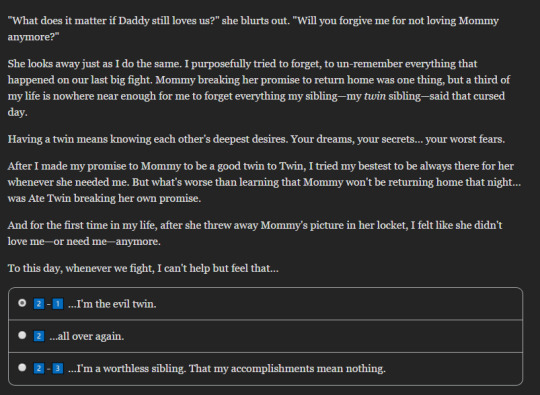
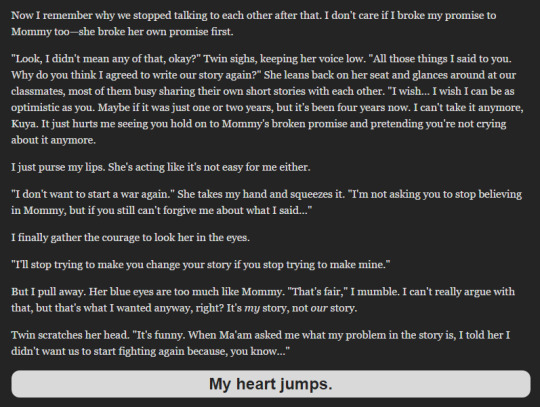
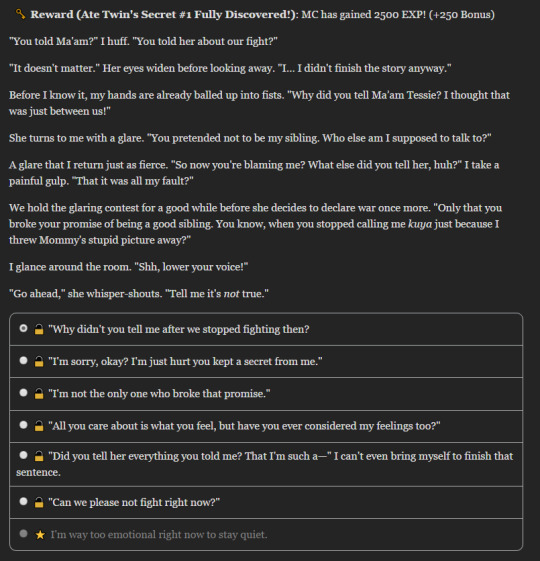
The fight still happens out of the blue, but I'm hoping that with a bit of build-up, the accidental secret reveal from Twin just as the tension drops gives it more of an impact. Lemme know what you all think!
And yup, I found an opportunity to let you choose your MC's Enneagram Type wings! The choices you get in the 4th page with the three options depend on which birthday wish you chose during the prologue.
Now that the scene rewrite is done, all that's left is cleaning up the to-do list. There's still a lot of miscellaneous stuff I need to do before the update, but this is the last major thing I needed to do!
23 notes
·
View notes
Text
you might not know this actually, but ant and I are in a throuple ...
53 notes
·
View notes
Text

i believe in mlp villains supremacy 🛐
23 notes
·
View notes
Text


jungle club - iac 2023 day sixteen
#🥺#they love it#ant and dec#2023#iac 2023#iac#on their socials#jungle club#🦊.gif#(gotta get an early night tonight... i'd rather be making gifs from tonights show though....)
39 notes
·
View notes
Text
I think the hug was so powerful not only because Margo so rarely experiences physical affection but also because it was a brief moment of grace that even she was not expecting to have.
She expected Aleida to hate her immediately.
#when was the last moment of grace (on a personal level) that we had for Margo?#one that was untainted by political will?#it was (imo) the dinner at Aleida's pre-1992 IAC#in which the two of them DID NOT hug#margo monday#for all mankind#for all mankind spoilers#margo madison#margo and aleida
20 notes
·
View notes
Text
(warning: all phrases with quotes around them are things i dont fully understand.) the last thing is that watchertv is being run through vimeoOTT, the same service dropout uses. interestingly, vimeo was originally started within collegehumor, which means it was later owned by IAC, the "holding company" that sold collegehumour to sam reich and now is a "minority owner" of dropout. Dropout was started before IAC killed collegehumor and sold it to sam, so vimeo and collegehumor and dropout where all closely connected and owned by IAC when dropout began. vimeo was "spun off" of IAC in 2021. i'm very curious if the rates that dropout pays vimeo were effected at all by them both beginning in collegehumor and being owned by the same company, and if those rates changed after 1. collegehumor died and 2. vimeo was spun off.
#gabbering#watcher#dropout#and of course how much does this service cost watcher#bcuz video hosting is extraordinarily expensive#i've seen a lotta ppl say it's a miracle dropout made it and not a replicable thing#i have a lot of questions like#what does being owned by IAC materially mean for a business#dropout has discussed having a horrible boss before and im gonna take a stab in the dark and say it was these guys#how much control does IAC have over what it owns and how does it exercise that control#and what does it being a minority owner of dropout mean for that amount of control. do things still have to be greenlit by them.#also how the fuck is vimeo alive video hosting and streaming is so expensive oh my god howwww are they hosting that shit and making profit?
12 notes
·
View notes
Text
IACS Publishes Recommendation on EEXI Implementation Guidelines
IACS Publishes Recommendation on EEXI Implementation Guidelines

View On WordPress
0 notes
Text
Meet the Team!!


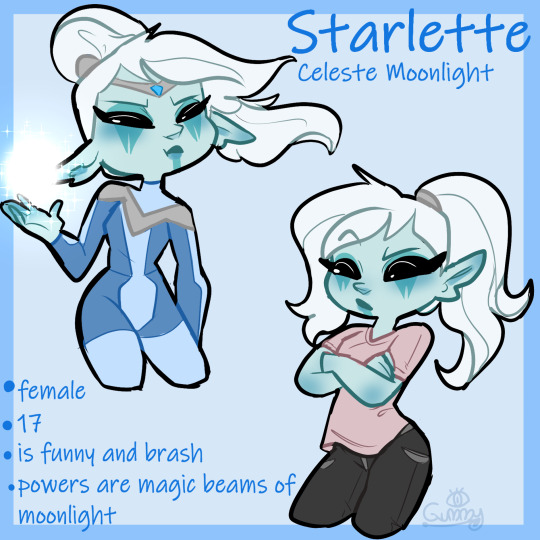

(previously posted on @gummygoatgalaxy 's blog)
36 notes
·
View notes
Text


AMIR FOLLOWS HIM AND PUTS HIS MINECRAFT BED WHEREVER JAKE PUTS HIS <3
#jamir#thoughts within thoughts#my art#LMFAO MADE THE SKINS BC ME AND GUAC CEO WERE TALKING ABOHT A MINECRAFT THING AND ITS GOTTEN ME SOOOOO EXCITED#like what if wE JUST MADE THE IAC BUILIDNG#nfkmfndnd catastrophic levels of brainrot#but anyways its soooo hard to do jakes hair literally wtf#and also their outfits are based on real estate agent <3
9 notes
·
View notes
Text
"Biopics of massively famous musicians are rarely very good, often because they stumble at the question of whom exactly they’re being made for. Are you making a movie for the already initiated die-hard fans yearning to see the life and times of their hero reflected back at them in exacting detail? Or is your movie a welcome mat for novices, a breezy jukebox of greatest hits aimed at cultivating new generations of fans, goosing streaming tallies and catalog sales in the process? Most musician biopics never manage to resolve this tension, in part because they’re usually also serving a third master, namely the musician’s estate, which tends to hold its own, very specific ideas about on-screen depiction.
Bob Marley: One Love, the new movie about the late reggae superstar that’s produced by Marley’s widow, Rita, along with some of his children, is a biopic that does seem to know whom it’s for, which isn’t a point in its favor. The film is directed by Reinaldo Marcus Green (King Richard) and stars Kingsley Ben-Adir as Marley, who does his best with the role despite not really looking or sounding much like the real Marley. (Within the past four years Ben-Adir has played Malcolm X, Barack Obama, and Bob Marley, quite the triptych of historical figures.) Lashana Lynch plays Rita and steals the film in every scene she’s in, even if the movie’s script fails to elevate her character past the archetypical suffering-yet-supportive wife of a genius.
Rather than taking a cradle-to-grave approach to Marley’s life, One Love instead focuses on a single period of Marley’s career, his self-imposed exile to England in the aftermath of the 1976 attempt on his life at his home in Kingston, during which time he recorded Exodus, the 1977 LP that marked his full breakthrough into global superstardom. The film opens with the assassination attempt, after which we’re quickly whisked to London, where the film depicts Marley writing most of Exodus’ songs in a cloying series of “eureka!” moments that tend to populate movies of this kind. Snippets of Marley’s classic “Redemption Song” surface as a recurring musical motif in the film, and in one of the last scenes, we see Marley performing the song for his awestruck family in a sappy flourish that’s also anachronistic. (By most accounts, Marley didn’t write “Redemption Song” until 1979.) Periodically we’re treated to a series of flashbacks of the singer’s earlier life, a clichéd device that this movie could have used more of: Brief forays into Marley’s conversion to Rastafarianism are surprisingly well done, and a scene of a teenage Marley and the Wailing Wailers performing “Simmer Down” at Coxsone Dodd’s Studio One is the best moment in the film.
One Love is an inspirational tale about a Great Man who used music to unite the world, one that reduces one of the most consequential and complicated artists of the 20th century to a walking fount of genial aphorisms, the guy who suggested we all get together and feel all right. As such, the film indulges a decadeslong public appetite for a particular imagining of Marley that his estate now seems depressingly eager to feed. It’s been 42 years since Marley died of a rare form of melanoma at age 36, and I’m not sure there’s a musician who’s more literally iconic: Go to any commercial district in any part of the world and within minutes you’ll find an opportunity to buy something bearing Marley’s likeness. In the United States, Marley has been a staple of dorm-room walls for generations: The casual and underinformed co-optation of Marley by American bro culture has even inspired a recurring meme in which Marley’s name is erroneously affixed to an image of Jimi Hendrix.
To a certain brand of musical cynic, Marley has become the embodiment of a musician whom people own posters and T-shirts of but don’t actually listen to, which isn’t totally fair to most of the owners of those posters and T-shirts. Some of Marley’s music is still enormously popular: His 1984 greatest hits compilation Legend is currently enjoying its 820th week on the Billboard 200, a position it will likely maintain for the foreseeable future given One Love’s early, strikingly robust box-office projections. The only album that’s spent longer on the chart is Pink Floyd’s Dark Side of the Moon.
But in the pop-cultural imagination, Legend has completely eclipsed everything else Marley ever released. The album has sold more than 15 million copies in the United States alone, while no other Marley LP has sold even 1 million stateside. From a purely mathematical standpoint, this would indicate that for many fans, Legend is the first and only Marley album they’ll ever listen to. I’m not sure there’s another greatest hits compilation that has played such an outsize role in the public definition of an artist.
Legend is a fine little collection, but the idea that it’s some sort of one-stop synopsis of Marley’s career is absurd. For starters, 10 of its 14 tracks date from the period of 1977–80, a four-year time frame that represents the height of Marley’s global popularity but is a relatively minuscule cross section of a staggeringly prolific, nearly two-decade-long recording career. (Five of Exodus’ 10 tracks are included on Legend, which I suspect is one reason that One Love is so invested in the album’s significance.)
This period also coincides with a time when Marley’s music seemed to take a step back from revolutionary politics, a tack that may have been driven at least in part by the aforementioned assassination attempt. The Marley canonized on Legend is not the Marley who sang “I feel like bombin’ a church/ Now that you know that the preacher is lyin’ ” or who called for “burnin’ and a-lootin’ tonight … burnin’ all illusion tonight” or declared that “Rasta don’t work for no CIA.” The dominance of Legend in the U.S. is particularly striking when one considers that Marley’s highest-selling album in this country during his lifetime was 1976’s Rastaman Vibration, which peaked at No. 8 on the Billboard 200 and includes such overtly political tracks as “Crazy Baldhead,” “Rat Race,” and “War.” Legend doesn’t include a single track from Rastaman Vibration, instead opting for romantic fare like “Is This Love” and “Waiting in Vain” and feel-good anthems like “One Love/People Get Ready” and “Jamming.” (For an excellent deep dive into the history and legacy of Legend, I recommend this article from the Ringer earlier this week.)
One Day’s Director Has No Regrets About the Movie’s Controversial Ending
Legend’s preeminence has helped turn Marley into the musical equivalent of a tourist destination, at which One Love is just one more cozy attraction. This is worse than a shame, because the real Bob Marley was one of the most remarkable musical talents of the 20th century. As a songwriter, he was so prolific that music seemed to pour out of him, a quality that has sometimes led to a naturalization of his gifts that veers into exoticizing primitivism. (One Love certainly partakes in this.) But rather than being some carefree savant, Marley was a fiercely disciplined and ambitious artist from the very beginning. He wrote and recorded his first single, “Judge Not,” in 1962 at the age of 16, and it remains an astonishing debut, an effortlessly catchy melody sung by a voice that sounds both nervous and supremely confident in a way that only a teenager can manage.
By the time he signed to Island Records in 1972 and began his ascent to international superstardom, Marley had already written a lifetime’s worth of great songs. He had a preternatural ear for hooks and crafted songs that were ready-made hit records, three-minute gems of perfectly crystalized musical ideas. As a singer, his indelible tenor rasp and thrillingly improvisational style were the byproducts of an extraordinarily well-honed sense of intonation and time. And during the 1970s, he fronted what might have been the best band on the face of the earth, grounded in the peerless rhythm section of drummer Carlton Barrett and bassist Aston “Family Man” Barrett, the latter of whom died earlier this month at age 77. (Aston’s son and namesake, an accomplished musician in his own right, plays his father in the film.)
One Love doesn’t know how to begin exploring this artist and his art in any way that even begins to be interesting. Instead it just feeds back the same sanitized and saccharine idea of Bob Marley to the same audience who has been eating that up for generations. It’s a movie about a poster. Over the end credits of One Love, archival performance clips of Marley flash onto the screen, and for a few moments we’re treated to sounds and images that are infinitely more magnetic and thrillingly alive than anything we’ve seen over the preceding 100-ish minutes. That Bob Marley, and the extraordinary body of music he left behind, is still out there for those who go listening for it, but this movie isn’t where you’ll find him."






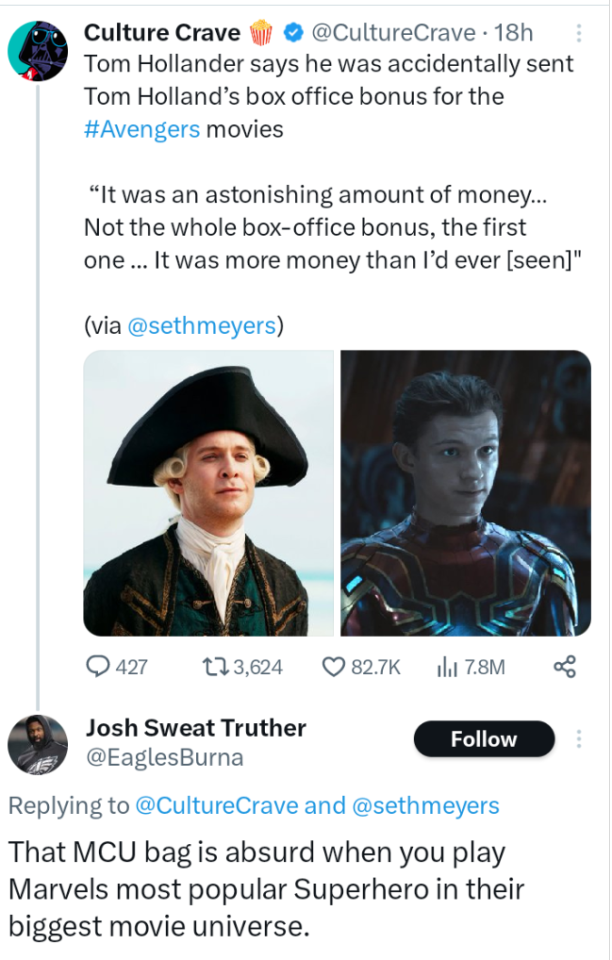

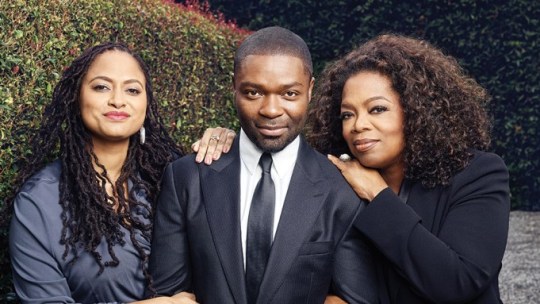
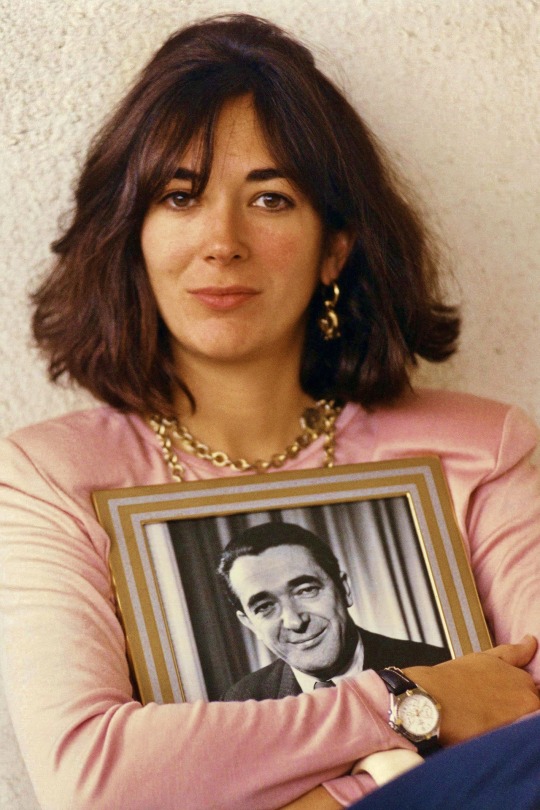
#Jamaica and The Legendary Marley Family Sell Patriarch Bob Marley Down The River For Weak Tepid White Washed One Love#Starring British Lavender Mafia Boy Kingsley Ben Adir#Irish Mob#Corrupt British Film Industry#British Thugs Allowed To Play Historic Black Figures#Malcolm X#Barack Obama#Hollywood Gay Mafia Connections#Scientology#Sony Pictures David Geffen#Warner Bros#David Zaslav#IAC#Barry Diller#Kingsley Ben Adir#David Oyelowo#Tom Hollander#Kristen Stewart#Elton John#Cillian Murphy#Stephen Fry#Mark Gatiss#Capote and The Swans Star Used In Threat Against Spiderman Star Tom Holland#British Parliament#BBC#ITV#Jamaica Compromised#Charlie Cox#Daredevil
6 notes
·
View notes
Text









Dunny (The Masked Singer UK: I’m A Celebrity Special 2023)
🚽 🚽 🚽/🚽 🚽 🚽/🚽 🚽 🚽
#stim#stimmy#stimming#sensory#stimboard#the masked singer#the masked singer uk#the masked singer uk: IAC special 2023#arachnophobia tw
6 notes
·
View notes